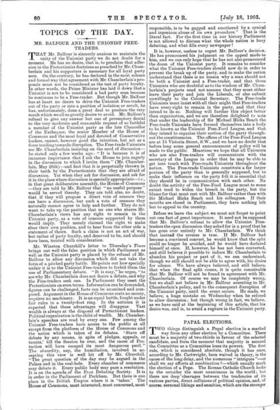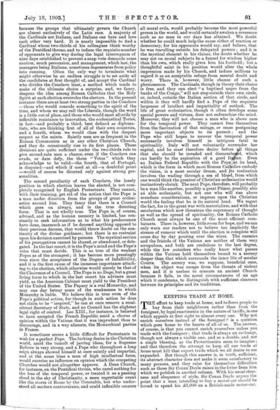PAPAL ELECTIONS. T WO things distinguish a Papal election in a
marked way from any other election by a Committee. There must be a majority of two-thirds in favour of the selected candidate, and, from the moment that majority is secured the Committee as a Committee loses its powers. The first rule, which is considered absolute, though it has once, according to Mr. Cartwright, been waived in theory, is the cause of the long delay, and the numerous "intrigues "âor shall we say efforts at combination Pâwhich usually mark the election of a Pope. The Roman Catholic Church looks to the outsider the most unanimous in the world; but there are deep 'cleavages between the tendencies of its various parties, direct collisions of political opinion, and, of course. Personal likings and enmities, which are the stronger because the groups that ultimately govern the Church are almost exclusively of the Latin race. A majority of the Cardinals are Italians, and Italians can hate and love each other very hard. It is nearly impossible to find a Cardinal whom two-thirds of his colleagues think worthy of the Pontifical throne, and to induce the requisite number of opponents to give way during the legal interregnum of nine days established to prevent a snap vote demands some caution, much persuasion, and management, which last, the managers being Italians, sometimes degenerates from policy into cunning. Often the only way to terminate what might otherwise be an endless struggle is to set aside all the candidates at first thought of, and accept the Cardinal who divides the Conclave least, a method which tends to make of the ultimate choice a surprise, and, we fancy, deepens the idea among Roman Catholics that the Holy Spirit at each election overrules the electors. In the present instance there are at least two strong parties in the Conclave âthose who would concede something to the spirit of the time, and whom we may call the -Liberals, though the word is a little out of place, and those who would meet all evils by inflexible resistance to innovation, the ecclesiastical Tories, in factâand probably a third, best defined as diploma- tists, who are thinking first of all of their own countries, and a fourth, whom we would class with the deepest respect as the saints. Saintly men are as frequent in the Roman Communion as in any other Christian Church, and they do occasionally rise to its first places. Those divisions are quite sufficient under the two-thirds rule to give second-rate men a chance, even if the Conclave can evade, or dare defy, the three " Vetos " which they acknowledge to be validâthe fourth, that of Portugal, is disputedâand which if used at allâa doubtful point âwould of course be directed only against strong per- sonalities.
The second peculiarity of each Conclave, the lonely position in which election leaves the elected, is not com- pletely recognised by English Protestants. They cannot, with their training, get rid of the notion that the Pope is a man under direction from the groups of great ecclesi- astics around him. They fancy that there is a Council which goes on always, and is the true directing force. That is not wholly true. The Pope is, of course, advised, and as the human memory is limited, has con- stantly to seek information as to what his predecessors ⢠have done, inasmuch as if he decreed anything opposed to their previous decrees, that wortld throw doubt on the con- tinuity of the divine guidance; but there is no restraint upon his decision exercised by persons. The mystical section of his prerogatives cannot be shared, or abandoned, or dele- gated. In the last resort, it is the Pope's mind and the Pope's voice that must decide. This is as true of the weakest Popes as of the strongest; it has become more pressingly true since the acceptance of the Dogma of Infallibility, and it is the first cause of the immense importance attach- ing to the election, which otherwise would merely be that of the Chairman of a Council. The Pope is no Doge, but a great living force to which in the last resort his advisers must yield, as the American Cabinet must yield to the President of the United. States. The Papacy is a real Monarchy, and may one day betray some of the weaknesses to which Monarchy is liable. We believe this is true even of the Pope's political action, for though in such action he does not claim to be "inspired," he can at once remove a recal- citrant Secretary of State, and no Council has the slightest legal right of control. Leo XIII., for instance, is believed to have accepted the French Republic amid a chorus of opinion within the Vatican that it was imprudent thus to discourage, and in a way alienate, the Monarchical parties in France.
It sometimes seems a little difficult for Protestants to wish for a perfect Pope. The lurking desire in the Christian world, amid the tumult of jarring ideas, for a Supreme Referee is very strong, and a Pope who throughout a long reign always showed himself at once saintly and impartial, and at the same time a man of high intellectual force, would exercise an influence on opinion which the competing Churches would not altogether approve. A Dean Church, for instance, on the Pontifical throne, who cared nothing for the loss of the temporal power, or treated it as a passing cloud in the sky of Christianity, a mere regrettable event like the storm of Rome by the Constable, but who under- stood all modern controversies, and could inflexibly censure all moral evils, would probably become the most powerful person in the world, and would certainly awaken a reverence such as no man in our days has attained. We doubt whether he could much help the cause either of reaction or democracy, for his opponents would say, and believe, that he was travelling outside his delegated powers ; and it is the mystical element in his claims, the doubt whether he may not on moral subjects be a funnel for wisdom higher than his own, which really gives him his foothold ; but a thoughtful saint in his position would alter the whole impression made by his Church, and induce millions to regard it as an acceptable refuge from mental doubt and worry. There is, however, little chance of such a phenomenon. The Cardinals, though in theory their choice is free, and they can elect "a baptised negro from the banks of the Congo," will not step outside their own circle, or, indeed, outside the Italian section of that circle, and within it they will hardly find a Pope of the requisite largeness of intellect and impartiality of outlook. The life of great ecclesiastics, though it often develops some special powers and virtues, does not enfranchise the mind. Moreover, they will not choose a man who is above care for the temporal power. They cannot free themselves from the fascination of that mirage, or cease postponing more important objects to its pursuit ; and the Pope who still hopes to recover the temporal power necessarily involves himself in intrigues fatal to spirituality. Italy will not voluntarily surrender her capital, and he must therefore desire before ll things that she should be invaded and dismembd, which can hardly be the aspiration of a good It . Even an Italian Federal Republic with the Popeyat its head, which is the form in which most Roman Catholics embody the vision, is a most secular dream, and its realisation involves the wading through a sea of blood, from which one would think the greatest of Christian ecclesiastics would instinctively shrink. The next Pope, therefore, will probably be a man like another, possibly a great Prince, possibly also an able ecclesiastic, but not one who will rise above mundane considerations, or impress upon the Christian world the feeling that he is its natural head. We regret the fact, for in the great war with materialism, and with that secularism which now threatens the supremacy of thought as well as the spread of spirituality, the Roman Catholic Church must always be one of the most efficient com- batants. There is, however, little room for hope, and we can only warn our readers not to believe too implicitly the stream of rumour which until the election is complete will come day by day pouring over the wires. The enemies and the friends of the Vatican are neither of them very scrupulous, and both are credulous to the last degree, while the few outsiders who really know what passes within the Vatican hold themselves bound to a secrecy deeper than that which surrounds the inner life of secular Courts. The secrecy was, we suppose, beneficial once, when its object was escape from the threats of violent men, and it is useless to censure an ancient Church because it fails, in the novel circumstances of an age which it condemns, to distinguish with sufficient clearness between its principles and its traditions.











































 Previous page
Previous page